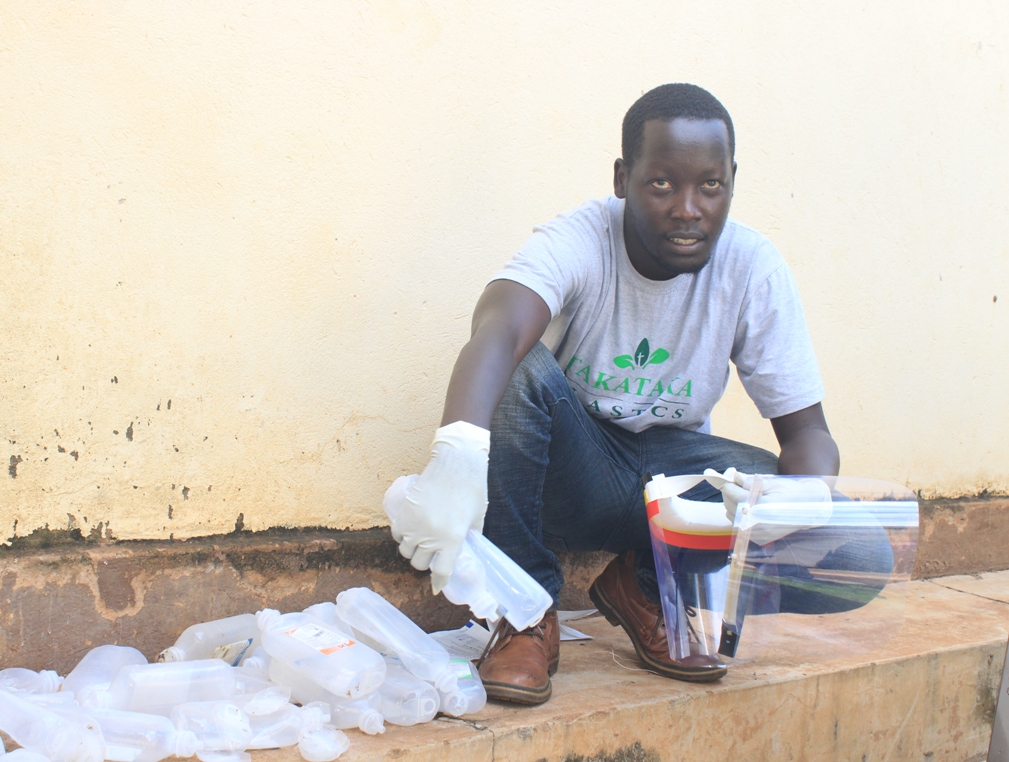Peter Okonkwo displaying the face shields made out of plastic waste
GULU-UGANDA: To many people around the world, Coronavirus is the worst enemy of human kind that came with no other intention but to extinct humanity, while to others, it is a challenge to provoke innovators to think outside the box.
29 year-old Peter Okonkwo is no different from those innovators who are thinking outside the box in this period that the whole world is battling the novel Coronavirus.
Okonkwo, the co-founder and the Chief Operation Officer of Takataka plastics based in Laroo Division in Gulu Municipality was initially making wall tiles using plastic wastes like medical wastes, soda and water bottles, but as the pandemic breaks out in Uganda something that sent the health sector into urgent need of protective gear, he halted the wall tiles project to start making face shields out of those plastics wastes.
In a relatively small and simple work space, Okonkwo and his colleague Paige Balcom a PhD student in mechanical and development engineering in the University of California and the co-founder and Chief Technical Officer of Takataka plastics make those face shields for the frontline health workers.
The duo with the help of their employees collect the plastic wastes from the different collection points like St. Mary’s Hospital Lacor, assemble them together at the workshop. The plastics are then sorted, stickers on them cut away before cleaning them thoroughly with liquid soap and plenty of water. They are spread to dry cutting them into pieces.
“We cut them into smaller pieces using either automatic or manual shredder that we have installed here.” Okonkwo explains to Black Star News as he cuts the plastics into pieces using an electric shredder placed at the corner of one of the rooms at the workshop.
Okonkwo then collects the shredded pieces of the plastics using a tray-like piece of wood and takes it to another room where a machine for melting the plastics are being operated by two male workers with the assistance of a female worker.
“Here, we place the shredded pieces of the plastics into this machine and later melt them into a liquid form and then pour it into the designed mould.” He explain
At this stage, two other female employees of Takataka Plastics are busy cutting bicycle tubes to make the straps of the shield.
The frame of the shield is then carefully removed from the mould and taken to another room for assembling into a complete face shield ready for use. Each assembled face shield comprises of a plastic frame that holds the shield from the forehead, the rubber strap that holds is from the back of the head, and the actual face shield that is cut out from a colourless stencil screen.
Okonkwo calculates that to make 1,000 pieces of the face shields, they require 60 kilograms of the plastic wastes and that each face shield of sold at UGX 10,000 (about US$2.7).
“We are selling these face shields very cheaply and on a one-for-one module where, for each face shield bought, we donate one to a government health facility. Under this module, we anticipate to donate over 600 face shields to these health facilities.” Okonkwo notes
With the goal of locally transforming plastic wastes into marketable products and to create jobs, Takataka Plastics is employing a total of 14 youth as engineers, machine operators and casual labourers. Among the employees at Takataka Plastics, seven are former street kids whose lives are slowly being transformed into productive citizens of the country.
For every 60 kilograms of plastic waste, 1,000 pieces of face shields are made, meaning, the innovation is not only to help the frontline health workers have protective gears, but to also save the environment from pollution following the improper disposal of plastic waste. They target to recycle 9 metric tons of plastic waste every month, translating to UGX 1.5 million (about US$ 402).
Paige revealed that the first prototype of the face shield they made was from a soda bottle that was cut. “We made our first face shields, so over the other several coming weeks, we refined the prototypes, went to clinics in town and got feedback from health professionals and continued to improve the design and eventually came out with this disposable face shields.” Paige explains
“The doctors and nurses really liked and appreciated it, we want to even improve it further and make reusable face shields.” She adds
According to Paige, they are currently making 70 face shields in a day but are planning to scale up production to 150 pieces per day.
“The goal is that we donate these face shields to government health facilities and sell some to the private health facilities and other large organizations. We do a one for one module where if you buy one face shield at UGX 10,000.00 (about US$2.7.) that covers the cost of being able to also give a face shield to a health facility that has no funds for them.” Said Paige
Takataka Plastics has so far made over 20,000 pieces of the face shields and also donated over 400 to different government health facilities like; Lira Regional Referral Hospital, Kitgum Referral Hospital, the Judicial Office in Pader, among others.
Denise Oryang, a health worker at St. Phillips Health Center III, Church of Uganda health facility in Gulu town, revealed that the health facility received five pieces of the face masks that really rescued them.
“These face shields came as a rescue to us because we were working without them despite the fact that we sometime carryout risky procedures that may expose us to the risks of getting infected.” Oryang noted






